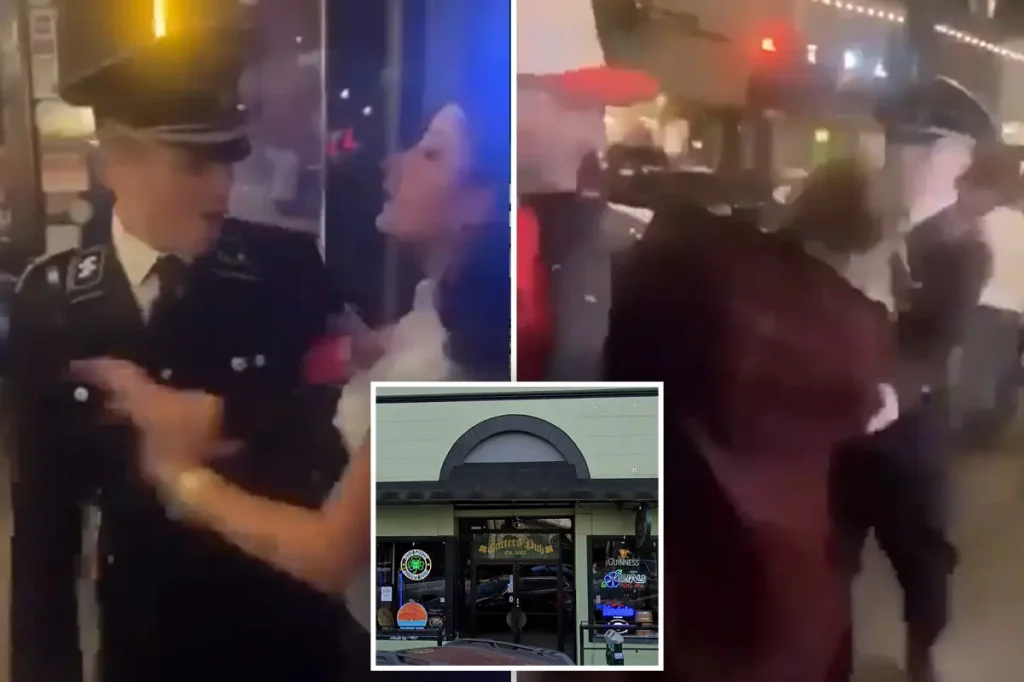Nazi Cosplayer’s Violent Outburst Leads to Arrest at Georgia Bar
In a shocking incident that highlights the dangerous intersection of hate symbols and public behavior, a 33-year-old man named Kenneth Leland Morgan was arrested after a violent confrontation outside a Georgia bar on Thursday night. Morgan, who had dressed as a Nazi Gestapo officer for Halloween, attempted to enter Cutters Pub in Athens but was immediately confronted by outraged patrons who recognized the deeply offensive nature of his costume. The ensuing altercation escalated quickly, with multiple bystanders expressing their disgust at Morgan’s choice to wear Nazi regalia in a public setting. Video footage captured the tense moments as a woman forcefully told Morgan, “Get the f–k out, you don’t f–king wear that s–t,” while physically preventing him from entering the establishment. Rather than leaving peacefully or reconsidering his costume choice, Morgan’s response to the confrontation revealed a disturbing attitude – witnesses reported he was “grinning ear to ear” throughout the incident, suggesting he may have intentionally provoked the reaction.
The situation took a violent turn when Morgan, after being pushed onto the sidewalk outside the bar, allegedly smashed a glass beer pitcher into the face of University of Georgia student Grace Lang. Lang, who studies photography and geology, suffered a broken nose from the assault. According to her account, she had been at Cutters Pub for only about 20 minutes when her Jewish friend noticed Morgan in his full Nazi uniform, complete with the infamous red armband bearing a swastika. Witnessing Morgan in a confrontation with two women smaller than himself, Lang stepped between them and attempted to remove the swastika armband, resulting in a physical struggle. Throughout this entire interaction, witnesses noted Morgan’s unsettling demeanor – he continued smiling even as the situation deteriorated and ultimately as he committed the violent assault. This behavior suggests the costuming choice was not merely thoughtless but potentially deliberately provocative.
The aftermath of the incident saw swift action from local authorities. Athens Clark County Police arrested Morgan around 3:00 am Friday on charges of felony aggravated assault and misdemeanor battery. Court records indicate he was placed on a $1,500 bond. The serious nature of the charges reflects both the physical harm caused and potentially the context of the assault, which occurred during a confrontation over symbols widely recognized as representing hate and genocide. The incident has sparked conversations in the community about the boundaries of free expression, particularly when that expression involves symbols associated with historical atrocities. Many have pointed out that while costume choices during Halloween might seem like harmless fun, wearing Nazi symbols remains deeply offensive and potentially traumatic for many people, particularly those with personal or family connections to the Holocaust.
Patrick Depaolo, the owner of Cutters Pub, expressed relief that Morgan was arrested but regret that the situation had escalated to violence. “He thought it was funny, nobody else thought it was funny,” Depaolo told reporters, highlighting the disconnect between Morgan’s apparent amusement and the serious offense taken by others present. This disconnect illustrates a broader social issue regarding the normalization or trivialization of hate symbols in public spaces. While Morgan may have viewed his costume as provocative or even humorous, the reaction from patrons demonstrated a community largely united in their rejection of such symbols. The pub owner’s statement that he was “glad everyone’s safe” despite Lang’s injuries reflects the understanding that the situation could have potentially escalated even further had more patrons become physically involved.
The incident at Cutters Pub raises important questions about social responsibility and the recognition of historical context when making personal choices that affect public spaces. Nazi symbols represent one of history’s darkest periods, during which millions of people were systematically murdered based on their ethnicity, religion, sexual orientation, or disabilities. For survivors of the Holocaust and their descendants, as well as for many others, these symbols continue to evoke deep trauma and fear. When someone chooses to display such symbols in a public setting like a neighborhood bar, they are not making a neutral fashion statement but rather bringing charged historical references into spaces where people gather for relaxation and community. The swift and negative reaction from patrons at Cutters Pub demonstrates that many communities maintain strong social norms against the casual display of such inflammatory symbols.
This case also illustrates the potential legal consequences that can result when provocative behavior escalates to physical violence. While wearing offensive costumes is generally protected as free expression in the United States, that protection does not extend to assault or other violent acts. Morgan’s choice to respond to criticism with violence transformed what might have remained a heated verbal confrontation into a criminal matter with serious charges. The incident serves as a reminder that personal choices carry consequences, both social and legal. For Lang, what began as a night out with friends resulted in physical injury and trauma. For Morgan, what may have started as an offensive costume choice ended with arrest and criminal charges that could potentially impact his future. As communities continue to navigate complex questions around free expression, historical memory, and mutual respect, incidents like this one in Athens provide stark illustrations of what can happen when these tensions erupt into real-world confrontation and violence.


